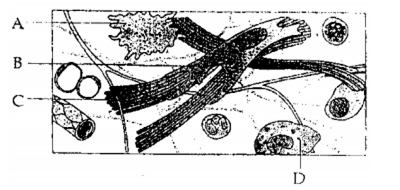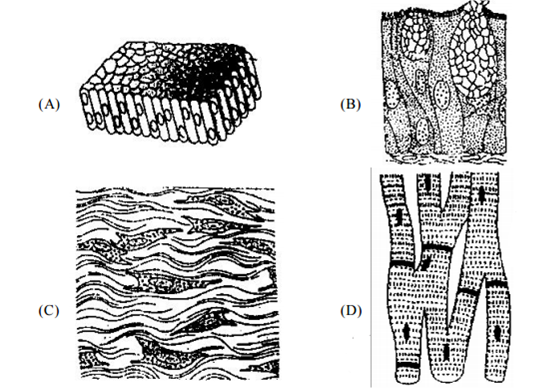 Multiple Choice Questions
Multiple Choice QuestionsWhat external changes are visible after the last moult of a cockroach nymph?
Mandibles become harder
Anal cerci develop
Both fore wings and hind wings develop
Both fore wings and hind wings develop
The function of the gap junction is to
performing cementing to keep neighbouring cells together
facilitate communication between adjoining cells by connecting the cytoplasm for rapid transfer of ions, small molecules and some large molecules.
separate two cells from each other
separate two cells from each other
The body cells in cockroach discharge their nitrogenous waste in the haemolymph mainly in the form of
ammonia
potassium urate
urea
urea
Pheretima and its close relatives derive nourishment from
sugarcane roots
decaying fallen leaves and soil organic matter
soil insects
soil insects
Choose the correctly matched pair.
Tendon - Specialised connective tissue
Adipose tissue - Dense connective tissue
Tubular parts of nephrons - Cuboidal epithelium
Tubular parts of nephrons - Cuboidal epithelium
Compared to those of humans, the erythrocytes in frog are
without nucleus but with haemoglobin
nucleated and with haemoglobin
very much smaller and fewer
very much smaller and fewer
Select the correct statement from the ones given below with respect to Periplaneta americana
Nervous system located dorsally, consists of segmentally arranged ganglia joined by a pair of longitudinal connectives
Males bear a pair of short thread like anal styles
There are 16 very long Malpighian tubules present at the junctions of midgut and hindgut
There are 16 very long Malpighian tubules present at the junctions of midgut and hindgut
Given below is the diagrammatic sketch of a certain type of connective tissue. Identify the parts labelled A, B, C and D, and select the right option about them.
| Part A | Part B | Part C | Part D |
| Macrophage | Fibroblast | Collagen fibres | Mast cells |
| Part A | Part B | Part C | Part D |
| Mast cell | Macrophage | Fibroblast | Collagen fibres |
| Part A | Part B | Part C | Part D |
| Macrophage | Collagen fibres | Fibroblast | Mast cell |
| Part A | Part B | Part C | Part D |
| Macrophage | Collagen fibres | Fibroblast | Mast cell |
The four sketches (A, B, C and D) given below, represent four different types of animal tissues. Which one of these is correctly identified in the options given, along with its correct location and function?
| Tissue | Location | Function |
| Glandular epithelium | Intestine | Secretion |
| Tissue | Location | Function |
| Collagen fibres | Cartilage | Attach skeletal muscles to bones |
| Tissue | Location | Function |
| Smooth muscle tissue | Heart | Heart contarction |
| Tissue | Location | Function |
| Smooth muscle tissue | Heart | Heart contarction |
How many pairs of contrasting characters in pea plants were studied by Mendel in his experiments?
Five
Six
Eight
Eight
